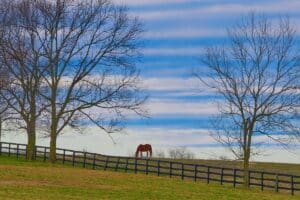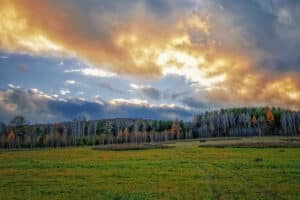The process of valuing rural acreage can be challenging and a direct correlation usually exists between the level of difficulty and the number of features that the property offers. Although most experts consider real estate a tangible asset, many facets concerning the value of rural acreage are 100% intangible and very often it is burdensome to accurately assess a fixed dollar amount to these features. The list of intangible property features is endless but some of the most common examples are location, aesthetics, and the quality of recreational opportunities. When representing buyers and sellers of rural acreage, brokers should recognize intangible property features and initiate conversations about how they affect the value of a given property. The following questions can be beneficial to voice in order to trigger thoughts regarding how much intangible property features can actually offset cost and what they are actually worth to a buyer and/or seller:
- How much time and money will be saved over the next 5 years commuting to a farm 30 minutes away as opposed to an hour away? Two hours away?
- What could the future hold for that adjacent parcel that just came on the market?
- How will the future use of that adjacent parcel affect the property that I am buying, selling, or currently own?
- What would be the cost of purchasing a small parcel for access purposes on a tract that currently only offers easement access?
- How much money that could be used to improve for sale property is being left on the table by not leasing out hunting rights, farming rights, etc.?
- How much will it cost to convert a bottom field into a duck impoundment? Will it be productive?
- How much will it cost to convert an old pasture into a dove field? Will it be productive?
Often times asking these questions creates a platform for promoting the value (or detriment) of intangible property features. Although buyers and sellers make the final decisions surrounding transactions on real estate, brokers can ensure their clients are asking themselves the right questions during the final stages of their due diligence. Some of these questions might include the following:
Should a buyer purchase one property over another that’s very similar because the price is lower when the main feature they really want is already in place on the more expensive property?
This scenario should obviously be approached on a case-by-case perspective but, in many instances, the answer is going to be no. Most buyers looking to purchase a recreational tract in today’s market are looking for great deals because of the large inventory currently available. It is important for brokers to point out the value of existing, intangible features that might be overlooked because of the elevated asking price of the property – especially if that feature is one that a buyer has specifically identified as desirable.
Should a buyer consider paying a little more for a desirable adjacent tract to the property they already own?
Again, this is another hypothetical situation but quite often the answer to this question is absolutely. A common scenario that is often devastating to a landowner is the situation where an adjacent property is purchased and the new owner changes the use of the property in such a manner that it has a detrimental effect on the neighboring tracts. Paying more for that adjacent parcel might seem like a bad investment today but it could pay huge dividends down the road in terms of protecting the nature of the property.
Is the asking price on a listed property inflated based on unproven intangible property features?
This common scenario surfaces with the quality of hunting and fishing on a recreational property. Often times, a tract will hit the market that has great potential for being a first class hunting and fishing property if the appropriate improvements are implemented and the asking price has incorporated this potential. The bottom line on this kind of property is that unproven results do not translate into actual value. Most buyers willing to pay extra for intangible property features need to see that these features actually exist. As a property owner looking to sell a tract that has quality recreational potential it is important to consider that implementing the improvements up front will very likely result in a better day at the closing table.
A strong argument can be made that transforming a rural parcel of land into a quality recreational property is typically a long-term process that requires much time, effort, and money. As timber values continue to hover at low end numbers and rural land owners are considering different uses for their property, it is important to analyze intangible property features. These features regularly affect property values and taking the time to conduct an analysis regarding the value of each intangible property feature will improve one’s education in the purchase or sale of rural land.
This content may not be used or reproduced in any manner whatsoever, in part or in whole, without written permission of LANDTHINK. Use of this content without permission is a violation of federal copyright law. The articles, posts, comments, opinions and information provided by LANDTHINK are for informational and research purposes only and DOES NOT substitute or coincide with the advice of an attorney, accountant, real estate broker or any other licensed real estate professional. LANDTHINK strongly advises visitors and readers to seek their own professional guidance and advice related to buying, investing in or selling real estate.









Rusty this is so true in my part of Alabama too. It is difficult to advise clients on how to assign an accurate value to intangibles when selling or buying. Appraisers feel the same way. Thanks for the article.
“Although most experts consider real estate a tangible asset, many facets concerning the value of rural acreage are 100% intangible and very often it is burdensome to accurately assess a fixed dollar amount to these features. The list of intangible property features is endless but some of the most common examples are location, aesthetics, and the quality of recreational opportunities.”
Great article Rusty. I agree with your above statement, however, I believe that your list of questions to ask could be expanded to include a broader range of sustainability-related issues that will become more obvious as we move deeper into the 21st century.
Ecosystem-Based Management (EBM) is an integrated approach that considers the entire ecosystem, including humans and elements, integral to ecosystem functioning. Informed by both natural and social science, EBM is intended to preserve and restore natural and cultural heritage by sustaining diverse, productive, resilient ecosystems and the services they provide, thereby promoting the long-term health, security, and well-being of our communities. Among other things, EBM specifically recognizes that humans are part of ecosystems and that healthy ecosystems are essential to human welfare – http://www.triplepundit.com/2012/08/3p-approach-being-implemented-southern-oregon/
Sustainable Land Development Initiative
Excellent article. So much of what I have to sell on a daily basis are the intangibles. Those intangibles make almost every spot unique.
As difficult as it can be, uncovering the true value of the intangibles is one of the tasks of land brokerage that keeps things interesting. There is always a new challenge in this pursuit – never a dull moment!
Thanks for the comments!
All of these elements are especially true when considering property with water. It pays to look at everything that can impact water quality and recreation. Of course these are services we offer.
The intangibles are so subjective. For example, do you value smaller clear beautiful bodies of water more or less than larger less aesthetic waters where motorboats are allowed?